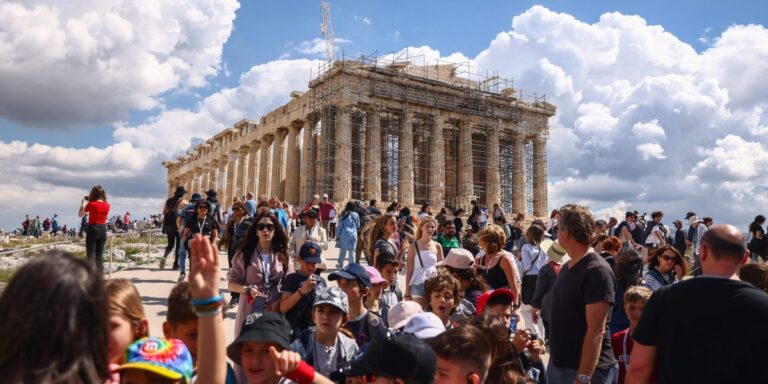Summer in Athens is synonymous with historical sites like the Parthenon, colorful markets and platters of souvlaki, but lately the city is finding it hard to cope with the growing number of people looking for exactly those things.
Authorities in the Greek capital, Athens, have lamented that the city has slipped into over-tourism territory, with crowds getting out of hand. As tourists flocked to Greece outside of the summer season, the city capped the number of visitors allowed to visit the Acropolis at 20,000 last year.
Tourism is a double-edged sword in Greece: Tourist numbers are exploding out of control, growing 120% between 2019 and 2023. But policing it is no easy task, as 25-30% of Greece’s GDP comes from tourism, and in Santorini that figure jumps to 90%.
Still, Athens Mayor Haris Doukas said tourism in its current form is not sustainable due to the problems of excess tourism and its impact on local communities and the city itself.
“Each tourist brings 0.4 euros to the city and we haven’t received that revenue yet,” Doukas told Euronews. “We need to find a way to keep tourism alive.”
 Tourists at Monastiraki Square in Athens, Greece, photographed in June 2024.
Tourists at Monastiraki Square in Athens, Greece, photographed in June 2024.
Hilary Swift—Bloomberg/Getty Images
Last year, a staggering 33 million tourists visited Greece, more than three times the country’s population. More tourists mean more local business activity and a boost to the economy. But this has also put undue strain on infrastructure, housing, and environmental resources. These issues are especially pressing as Greece continues to reel from the aftermath of recent wildfires.
“Tourism’s environmental pressures were found to be linked to changes in land use (through the construction of new infrastructure and facilities for tourists) and in particular the expansion of the urban environment at the expense of nature,” said a government report on sustainable tourism, published as part of a wider effort to change Greece’s approach to tourism.
Earlier this year, Greece introduced a “climate resilience tax” aimed at raising funds to help respond to natural disasters by levying a tax on tourists on hotel bills.
Managing overtourism sensitively and robustly
Greece has taken a series of measures to manage tourism, including extending the holiday season and imposing fines on beachgoers who take up too much space with sunbeds and umbrellas, given its links with the tourism and hospitality sector.
“Our goal is to protect both the environment and the public’s right to free access to beaches, while preserving tourism and healthy business spirit,” Economy Minister Kostis Hatzidakis said in a statement to AFP news agency.
At the peak of the pandemic three years ago, travel demand was close to zero, but has since bounced back, with other European cities feeling the effects, including Italy and the Netherlands, who are facing a similar phenomenon to Greece.
Amsterdam has responded to the threat of overtourism by curbing new hotel construction and planning to limit cruise ship docks at the port, while Venice introduced an entrance fee for tourists from this summer.
With tourist numbers rising steadily, countries, especially those where tourism is a key part of their economies, are having to strike a delicate balance between encouraging and restricting tourism.
To receive weekly strategies for moving up to executive office, subscribe to the Fortune Next to Lead newsletter. Registration is free.
Source link

